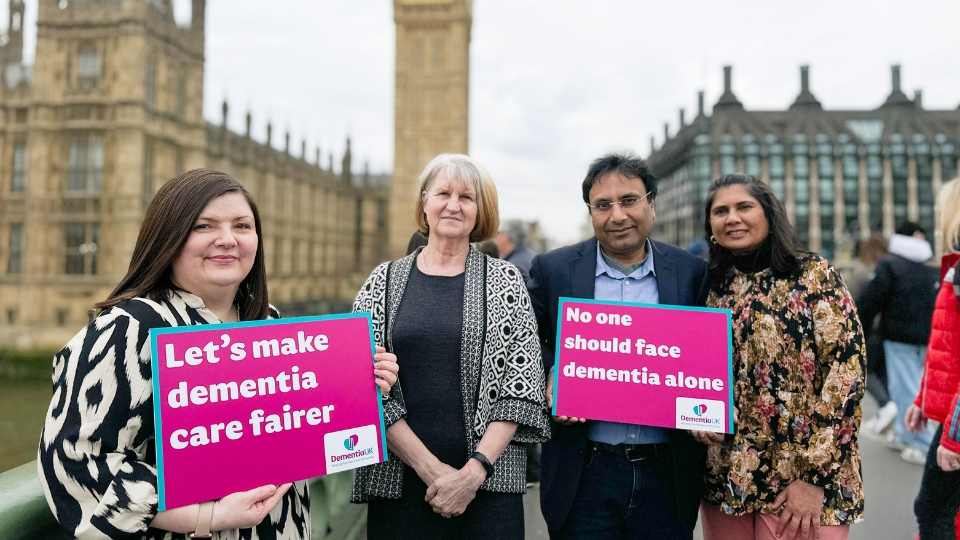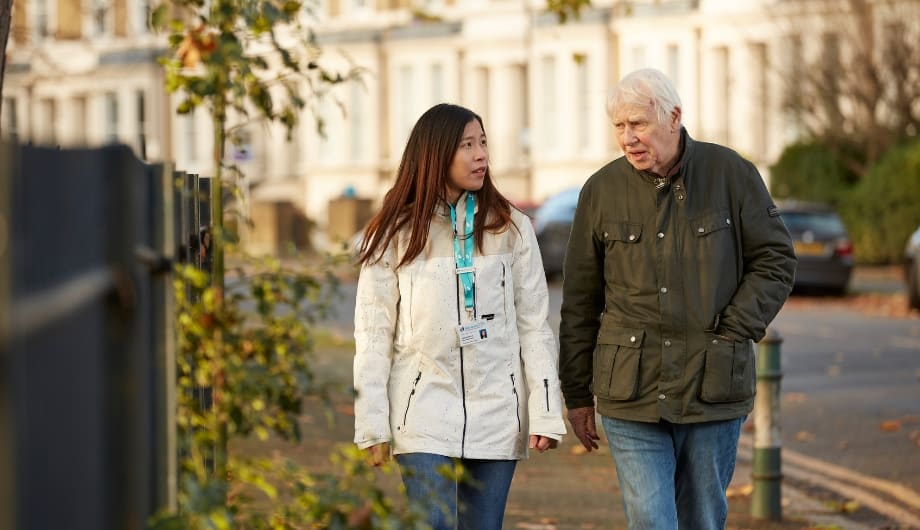
Fix the funding: make care fairer for people with dementia
We need the Government to urgently review the continuing healthcare funding process so that more people with dementia can access the support.
For too long arguments around funding have dominated how our dementia and wider care system should work, but this is a distraction from the human cost which sees families at breaking point – the process around NHS continuing healthcare (CHC) is a clear example of this.
For anyone who is living with dementia, with the condition’s progressive nature and potential to lead to spiraling care costs, NHS continuing healthcare can be a lifeline. It is a package of care that is fully paid for by the NHS, for adults with long-term, complex health needs; assessments hinge on how challenging people find everyday activities and the level of independence they have to perform them.

Our recent report, Guiding the way, which interviewed several family carers and dementia specialist Admiral Nurses, illustrates that the process can be riddled with delays and a fundamental lack of communication, with decisions often made inconsistently.
Every day which passes without a funding decision can heighten the anxiety of families, particularly when assessors do not have a thorough understanding around the complexities of dementia; needs can vary not only from person to person, but from one dementia subtype to the next. After all, someone who has dementia at 80 may have a very different presentation to someone diagnosed at 40. For the latter, their physical health may be good but they are living with a number of other challenges including changes to their personality, relationships, behaviour and social functioning.
If a decision is made that the person is not entitled to CHC funding, then this can have repercussions on their ability to live as well as possible with the condition, such as funding allowing a specialist care package or a move to a specialist care facility. Over a number of years, thousands of people with a range of conditions, including those living with dementia, have had their applications rejected. Given the level of need we hear day in, day out on our national Admiral Nurse Dementia Helpline, we know that many families are slipping through the net due to a lack of understanding of the effects of dementia on everyday life and the person’s health needs.
It’s not just the lack of awareness of clinical professionals which can affect people living with dementia, but also the families’ own lack of awareness around the process. Faced with lengthy submissions and numerous meetings to assess the needs of their relatives, families can feel discouraged about going through the process. Meanwhile others can find that the tortuous application process can take time away from their caring responsibilities, feel demoralised and give up.
Time is at a premium for families with dementia, who are facing unpredictability and significant declines in health. Therefore, we need to guide the way to a more improved CHC system which mitigates this human cost. Dementia specialist nurses and other health professionals with an understanding of dementia can support families in making sense of the application, advising them on how to recognise and articulate their needs. Many unpaid carers internalise what they are going through and the assumption from assessors is that they are ‘coping’ when the reality is very different.
More widely, it is about promotion of the CHC process across local NHS bodies and relevant organisations, ensuring that an understanding of dementia is built into the process. Assessors should be knowledgeable about dementia and there should be a dementia specialist on the decision panel so they can advise on the needs of the person with dementia. For the families, we should be looking at making the process as manageable as possible for them. This can be by giving them sufficient time to gather evidence and clear templates on how to position the evidence, so it is clear to assessors what can happen in different scenarios and not just how a person presents on their ‘good day.’
Despite being one of the fundamental components of a care system, CHC has become emblematic of just how flawed the system is for families living with the effects of dementia – and how it leads to more emotional and financial hardship that the process was designed to address.
Whilst we are still left in the dark about reforms to the disparate health and social care systems and how such reforms will bring wider benefit to families with dementia, the CHC process is something which exists right now for families. We can guide the way for them to get the support they so desperately need. This can be by introducing the right training for health and social care professionals, in addition to the resources to empower families to express their needs throughout their case.
Every CHC application which is rejected or delayed through appeal, and which gives families no prospect of funding, signifies another blow to having a health system which works for families living with the effects of dementia. Dementia may be a hidden condition, but it is up to assessors to see the humanity behind every decision they are making – the human cost is immeasurable if they do otherwise.

We need the Government to urgently review the continuing healthcare funding process so that more people with dementia can access the support.
Some people with dementia qualify for NHS continuing healthcare (CHC) funding to meet the costs of some of their care needs, but the application process isn’t always easy. Here, we explain the facts you need to know about CHC and advice from our dementia specialist Admiral Nurses.

Whether you have a question that needs an immediate answer or need emotional support when life feels overwhelming, these are the ways our dementia specialist Admiral Nurses can support you.